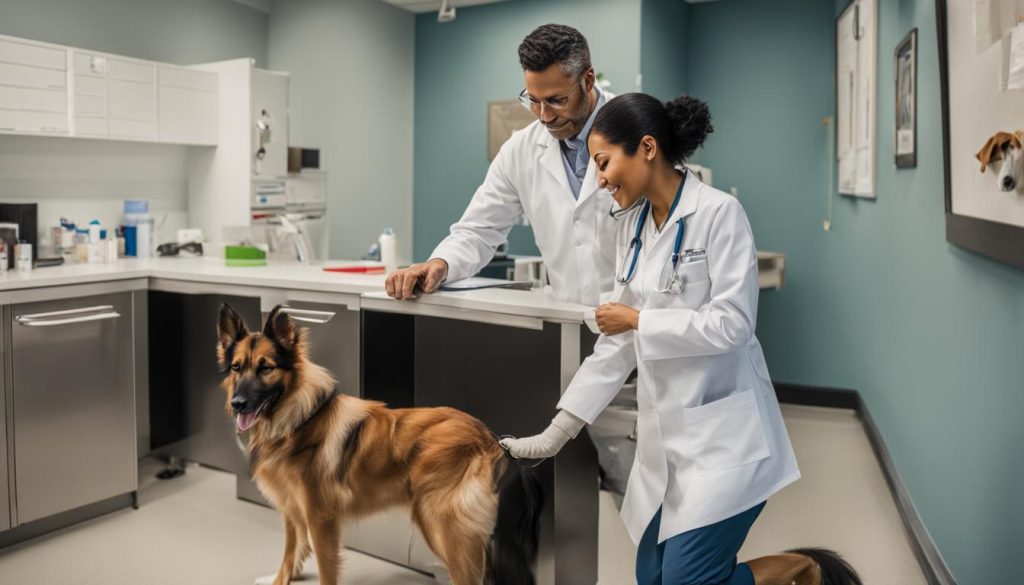Welcome to the Optimal Dog Vet Visit Frequency Guide! As a responsible dog owner, you may find yourself wondering, “How often should I take my dog to the vet?” Veterinary care for dogs is crucial for their health and well-being. Dogs are experts at hiding signs of illness, making regular vet check-ups essential for proactive preventative care. The frequency of these visits depends on various factors, including your dog’s age, breed, lifestyle, and overall health.
During these check-ups, your veterinarian will perform a thorough examination and address any concerns you may have about your dog’s health. Vaccinations, dental care, weight monitoring, and parasite control are also discussed to ensure optimal dog health. It’s important to remember that every dog is unique, so it’s best to discuss your specific pet’s needs with your veterinarian.
Key Takeaways:
- The frequency of dog vet visits depends on factors like age, breed, lifestyle, and overall health.
- Puppies require more frequent check-ups, while adult dogs typically need annual visits, and senior dogs benefit from biannual check-ups.
- Vet visits for puppies include vaccination schedules, wellness exams, and discussions about diet, dental care, and spaying/neutering.
- Adult dog check-ups involve physical examinations, dental assessments, weight monitoring, blood work, and discussions on preventive care.
- Senior dogs should have biannual check-ups for comprehensive monitoring and detection of age-related conditions, such as arthritis and dental disease.
Now that you understand the importance of regular vet visits, you can prioritize your dog’s veterinary care and ensure their well-being and longevity. Remember, your furry friend relies on you to be their advocate for optimal health!
Puppy Checkups
When bringing a new puppy home, scheduling regular vet visits is important for their overall health and well-being. These vet visits are essential for ensuring that your puppy receives the necessary care and vaccinations to start them off on the right paw.
During these visits, a thorough examination of your puppy will be conducted to assess their overall health. The veterinarian will also administer the appropriate vaccinations to protect against common illnesses. These vaccinations are typically given at specific intervals, usually every three to four weeks until the puppy is around 16 to 20 weeks old.
In addition to vaccinations, regular check-ups provide an opportunity to monitor your puppy’s growth and development. The veterinarian will assess their weight, discuss their diet, and provide guidance on proper nutrition.
Furthermore, these check-ups also serve as a chance to discuss dental care, flea and tick prevention, and the option of spaying or neutering your puppy. Your veterinarian can provide valuable information and guidance on these important aspects of your puppy’s well-being.
By scheduling and attending regular puppy check-ups, you are taking proactive steps to ensure the long-term health of your furry companion.
Adult Dog Checkups
As responsible dog owners, it is important to ensure the overall health and well-being of our adult dogs. Regular vet appointments play a crucial role in achieving this goal. Annual wellness exams are recommended for adult dogs to monitor their health status and address any potential issues. These comprehensive check-ups involve several important components:
- Physical examination: During the vet visit, your dog will receive a thorough physical examination. This includes checking their vital signs, eyes, ears, mouth, joints, and overall body condition. The vet will look for any signs of illness or discomfort.
- Dental assessment: Dental health is an essential part of overall wellness in dogs. The vet will examine your dog’s teeth and gums, checking for any signs of dental disease, such as tartar buildup or gingivitis. They may also provide recommendations for dental care.
- Weight monitoring: Maintaining a healthy weight is important for your dog’s overall well-being. The vet will assess your dog’s weight and body condition, providing guidance on nutrition and exercise if needed.
- Blood work: Blood tests may be performed to evaluate your dog’s internal organ function and identify any potential underlying health issues. This can help detect diseases or conditions that may not be apparent during the physical examination.
In addition to these important components, preventive care is also discussed during adult dog check-ups. Vaccinations, parasite control, and other preventive measures are key aspects of keeping your dog healthy and protected from common diseases and pests.
By scheduling regular vet appointments and adhering to preventive pet care recommendations, you can ensure that your adult dog receives the necessary care for their optimal wellness. Remember to maintain a consistent schedule for vet visits to stay on top of your dog’s health needs.

Senior Dog Checkups
Senior dogs, typically aged seven years and older, should have biannual vet visits. These visits allow for thorough monitoring of their health status and early detection of age-related conditions. Regular check-ups are crucial to ensure senior dogs receive appropriate care and treatment tailored to their individual needs.
During these vet visits, the veterinarian may perform blood work, X-rays, and other diagnostic tests to assess the dog’s overall health. Special attention is given to common senior dog health concerns such as arthritis, dental disease, and organ function.
By keeping up with regular check-ups, senior dogs can receive the necessary care and interventions to maintain their health and well-being. It is important to address age-related issues promptly to ensure a better quality of life for our furry companions.
- Senior dogs should have biannual vet visits
- Vet visits allow for monitoring health and early detection of age-related conditions
- Blood work, X-rays, and diagnostic tests may be performed
- Special attention is given to common senior dog health concerns
- Regular check-ups ensure appropriate care and treatment tailored to individual needs
Conclusion
As a responsible dog owner, I understand the importance of regular vet visits for maintaining my dog’s optimal health. The frequency of these visits depends on various factors, including my dog’s age, breed, and overall health.
For puppies, more frequent check-ups are necessary to ensure they receive their vaccinations on time and to monitor their growth and development. Adult dogs, on the other hand, generally benefit from annual visits for preventive care, such as physical examinations, dental assessments, and vaccinations.
When my dog enters their senior years, it becomes even more crucial to monitor their health closely. Biannual check-ups allow the vet to perform more comprehensive assessments, including blood work and diagnostic tests, to catch age-related conditions early on.
By prioritizing my dog’s veterinary care, I fulfill my responsibilities as a dog owner and ensure their well-being and longevity. Regular vet visits are a key component of optimal dog health care, providing the necessary preventive and diagnostic measures to keep my furry companion happy and healthy.
FAQ
How often should I take my dog to the vet?
The frequency of vet visits for dogs depends on factors such as age, breed, lifestyle, and overall health. Puppies typically require more frequent check-ups, while adult dogs usually need annual visits. Senior dogs may benefit from biannual check-ups. It’s essential to discuss your dog’s specific needs with your veterinarian.
What do puppy checkups involve?
Puppy checkups usually include a thorough examination, vaccinations, and monitoring the puppy’s growth. Vaccines for common illnesses are administered at specific intervals, often every three to four weeks until the puppy reaches around 16 to 20 weeks old. Regular check-ups also allow for discussions on diet, dental care, flea and tick prevention, and the option of spaying or neutering.
How often should I take my adult dog for a checkup?
Adult dogs generally require annual vet visits for wellness exams. These exams involve a physical examination, dental assessment, weight monitoring, and blood work. Regular check-ups help detect and address potential health issues early on. Preventive care, including vaccinations and parasite control, is also discussed during these visits.
What about senior dog checkups?
Senior dogs, typically aged seven years and older, should have biannual vet visits. These visits allow for thorough monitoring of their health status and early detection of age-related conditions. The vet may perform blood work, X-rays, and other diagnostic tests to assess the dog’s overall health. Special attention is given to common senior dog health concerns such as arthritis, dental disease, and organ function.
Why are regular vet visits important for my dog?
Regular visits to the vet are essential for maintaining the optimal health of your dog. The frequency of these visits depends on factors such as age, breed, and overall health. Puppies require more frequent check-ups, adult dogs benefit from annual visits, and senior dogs may require biannual check-ups. By prioritizing your dog’s veterinary care, you help ensure their well-being and longevity.






